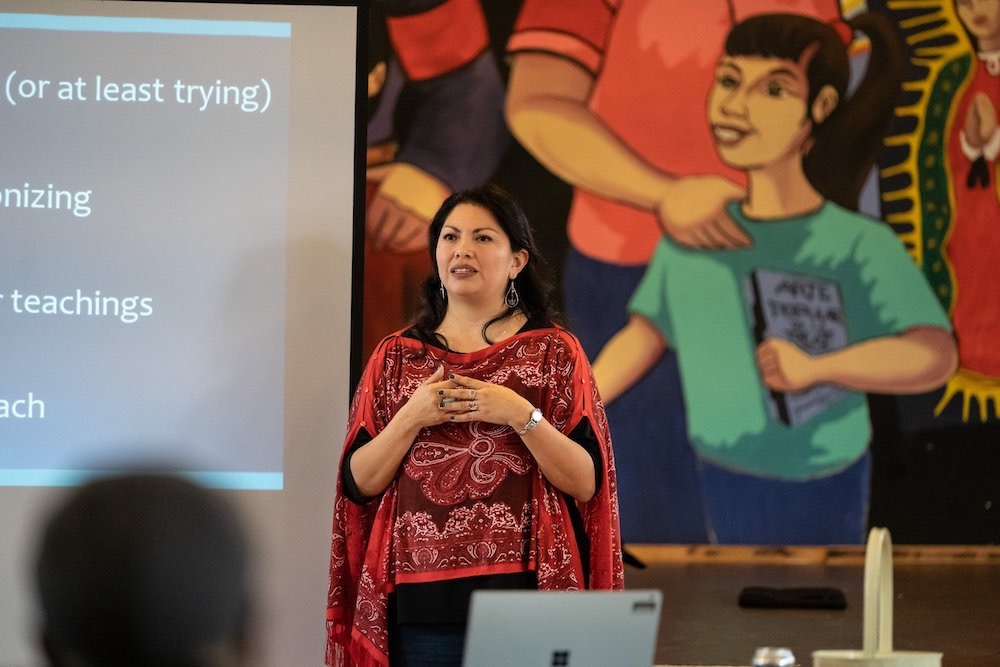
- Details
- By Native News Online Staff
Native Women Lead, an Albuquerque-based nonprofit that supports Native women entrepreneurs, has announced Shadiin Garcia, Ph.D., as its new Executive Director. A leader of Laguna Pueblo and Chicana heritage, Garcia brings decades of expertise in education, policy, and social justice to the role.
“We are thrilled to welcome Shadiin Garcia to steward Native Women Lead into its next chapter,” Vernelle Chase, Chair of the Board of Directors, said in a press release. “Her vision for fostering community strength and entrepreneurial agency aligns deeply with our commitment to building a future rooted in love, sovereignty, and innovation.”
Native Women Lead was founded in 2017 by a coalition of Indigenous women leaders. The organization has held business retreats and capital-growth summits and has launched three relationship-based lending funds, including the Matriarch Revolutionary Fund, the first Indigenous women’s gender lens investment fund.
Over the past three years, the nonprofit has supported 2,429 Indigenous women entrepreneurs from 480 Tribes, Pueblos, and Nations, investing nearly $2.8 million to uplift their businesses and communities.
Garcia’s appointment marks a new chapter for the organization as it continues to expand its impact. She overcame challenges at an underfunded Bureau of Indian Affairs school to attend Yale University as a Native American scholar and later became the first in her family to earn a Ph.D. Among her 62 first cousins, she also became the first to achieve this milestone.
Garcia’s career began as a teacher and administrator at the Heart of the Earth Survival School in Minneapolis, founded by the American Indian Movement. Her commitment to social justice and educational equity led her to public service, where she served as Deputy Director of Policy and Research for former Oregon Governor John Kitzhaber. In that role, she championed policies to uplift marginalized communities and transform education systems.
She was involved in crafting Oregon’s Senate Bill 13: Tribal History/Shared History, which integrated Native narratives into statewide curricula. She has also conducted research using Indigenous methodologies, supported language reclamation, and promoted land rematriation efforts.
“I am truly honored to join Native Women Lead, an organization rooted in the strength and visionary spirit of Indigenous women,” said Garcia. “With humility and a clear sense of purpose, I am excited to strengthen connections and advocate for the success of Native women entrepreneurs. Together, we will ensure every one of us has the tools, resources, and support to thrive and reclaim our joy and sovereignty.”
More Stories Like This
Native News Weekly (August 25, 2024): D.C. BriefsUS Presidents in Their Own Words Concerning American Indians
Ethics Complaint Alleges Former Navajo Nation Chief of Staff Accepted Gifts From Contractor
Monday Morning (December 14, 2025): Articles You May Have Missed This Past Weekend
Senators Demand Accountability Amid Reports of ICE Questioning Native Americans
Help us defend tribal sovereignty.
At Native News Online, our mission is rooted in telling the stories that strengthen sovereignty and uplift Indigenous voices — not just at year’s end, but every single day.
Because of your generosity last year, we were able to keep our reporters on the ground in tribal communities, at national gatherings and in the halls of Congress — covering the issues that matter most to Indian Country: sovereignty, culture, education, health and economic opportunity.
That support sustained us through a tough year in 2025. Now, as we look to the year ahead, we need your help right now to ensure warrior journalism remains strong — reporting that defends tribal sovereignty, amplifies Native truth, and holds power accountable.
 The stakes couldn't be higher. Your support keeps Native voices heard, Native stories told and Native sovereignty defended.
The stakes couldn't be higher. Your support keeps Native voices heard, Native stories told and Native sovereignty defended.
Stand with Warrior Journalism today.
Levi Rickert (Potawatomi), Editor & Publisher


